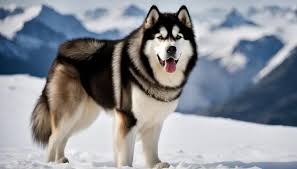
Alaskan Malamute
Conditions of detention
Alaskan Malamutes thrive in homes with a large yard where they can exercise and play. They are not well-suited for apartment living due to their size and energy levels.
Useful Fact: They do best in cooler climates and need plenty of exercise to stay healthy and happy.
Nutrition and diet
A balanced diet rich in high-quality protein is essential for Alaskan Malamutes to maintain their energy levels and muscle mass. Their diet should be formulated for large, active breeds.
Useful Fact: Split their meals into two servings a day to help prevent bloat, a common issue in large breeds.
Health
Alaskan Malamutes are generally healthy but can be prone to specific conditions such as hip dysplasia, elbow dysplasia, and hypothyroidism. Regular veterinary check-ups are essential.
Useful Fact: Regular exercise and maintaining a healthy weight can help prevent joint issues.
Grooming and care
The Alaskan Malamute has a thick double coat that requires regular brushing to prevent matting and reduce shedding, especially during their biannual shedding seasons.
Useful Fact: During shedding season, daily brushing is recommended to manage their heavy shedding.
Education and training
These dogs are intelligent but can be independent and strong-willed. Early socialization and consistent, positive reinforcement training are crucial.
Useful Fact: Enrolling them in puppy classes can help with early socialization and obedience training.
Toys and entertainment
Alaskan Malamutes enjoy activities that challenge them physically and mentally. Durable chew toys, fetch toys, and puzzle feeders are ideal.
Useful Fact: Regular playtime with interactive toys helps keep them mentally stimulated and prevents boredom.
Safety
Ensure your home and yard are secure, as Alaskan Malamutes are known for their digging and escape artist tendencies.
Useful Fact: Training them to respond to basic commands like “stay” and “come” enhances their safety.
Accessories
Essential accessories include a sturdy leash, collar, and identification tag. A comfortable bed and durable chew toys are also important.
Useful Fact: Given their strength and endurance, investing in a high-quality harness for walks and runs is beneficial.
Socialization
Early and ongoing socialization with different people, animals, and environments is vital for the Alaskan Malamute to develop a balanced temperament.
Useful Fact: Regular socialization helps prevent overprotectiveness and aggression towards unfamiliar people or animals.
Travel and Transportation
Alaskan Malamutes can adapt well to traveling if introduced gradually. Use a secure crate or harness for car travel to ensure their safety.
Useful Fact: Regular, short car rides can help them become comfortable with travel, reducing anxiety on longer trips.
Behavior and psychology
Alaskan Malamutes are known for their intelligence, loyalty, and friendly nature. They need mental and physical stimulation to stay happy and balanced.
Useful Fact: Providing them with a job or purpose, such as pulling a sled or participating in agility training, can satisfy their natural instincts and prevent boredom.
Legal aspects
Familiarize yourself with local pet laws, including licensing, leash requirements, and breed-specific legislation, to ensure compliance and avoid legal issues.
Useful Fact: Many regions require dogs to be registered and microchipped, ensuring they can be identified if lost.


